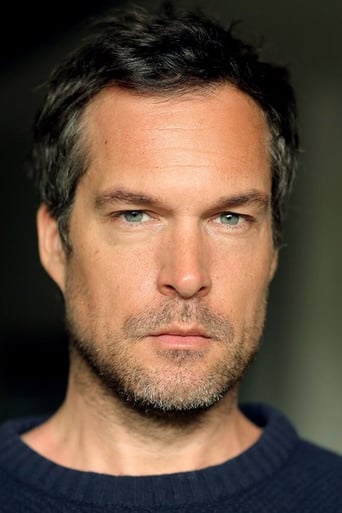Wordiezett
So much average
Acensbart
Excellent but underrated film
Maidexpl
Entertaining from beginning to end, it maintains the spirit of the franchise while establishing it's own seal with a fun cast
Cheryl
A clunky actioner with a handful of cool moments.
Horst in Translation (filmreviews@web.de)
"Dresden" is a German film from 2006, so it has its 10th anniversary this year. The director is Roland Suso Richter and if you know the name, you also know what to expect: He is a trademark director for opulent historically-themed movies for the small screen. And this is exactly what this is. It consists of two 90-minute episodes and deals with life in the city of Dresden at the end of World War II. People with an interest in history will immediately make the connection that Dresden is possibly the one city in Germany that was destroyed the most by the allied attacks. And a part of this movie is exactly about this. Another reviewer wrote about the historical importance of the film, but I cannot agree with this at all. While the war (action) scenes are probably still one of the better aspects of the film, it never makes an impact from a documentary perspective and it basically just sets a forgettable background for the bland stories of the main characters.The biggest character is portrayed by Felicitas Woll. I personally see her as a charismatic actress that is really beautiful (which saved the film a bit) but has no range. But you can't really blame her either for the generic way the character was written. Male main characters are played by John Light, Benjamin Sadler and Heiner Lauterbach and these last two are the perfect example of actors that shine through recognition value instead of range. I cannot say anything about Light as I have not seen him in other works. Sadly, Jürgen Heinrich, who I liked, has not a lot of screen time at all. Marie Bäumer also fits the description I gave earlier. Charismatic. recognition value. But not particularly talented.The story is the film's biggest problem. In the end, nothing stays memorable about this film at all, not from a historic perspective and certainly not about the characters. There are several cringeworthy scenes though when it comes to drama like Lauterbach's character's farewell (suddenly a good guy out of nowhere???) or Sadler's shooting scene at the very end almost that could have been so much better (again, Sadler is not to blame, but the blatancy of the filmmakers in their unsuccessful attempt to create something relevant). The worst part of the film is probably the romance though. Again, it is not the actors' fault, but it already starts in the way Woll's and Light's characters meet when he saves a boy from committing suicide after Sadler's character was very cold towards the grieving boy before. These are the scenes where the film is nothing more than a schmaltzy romantic drama and even if the filmmakers' intention to turn this into something more is visibly throughout the entire film, it is really almost never successful. Another painful moment was the ending when they went for a semi-happy ending (the birth, but the death) and tried to convince the audience that a non-gooey ending is something that prevents the film from being forgettable romantic schmaltz. It does not. I don't recommend the watch as it offers very little of quality and instead drags on so many occasions because of characters that were written in an uninspired fashion and without shades.
moreymark
This TV mini-series was recently shown on SBS television in Australia, and after reading David Irving's work on Dresden I decided to watch it. I was pleasantly surprised, as it was both entertaining and able to capture many of the issues around this controversial air-raid. The only major issue I felt was overlooked was that Dresden was never expected to be a target, and therefore was woefully unprepared. There were few air-raid shelters and little anti-aircraft protection of the city. The lack of anti-aircraft fire enabled the RAF to bomb very accurately, and was a major factor in the destruction that followed.Despite this, the story itself was reasonably well told. It is an common technique to use intimate relationships to help us focus on human tragedy. In this instance, the three-way relationship added an extra degree of tension to the story.
P_Cornelius
This film took up three hours, including commercials, on the History International Channel last night. But it felt like three weeks. It wasn't the cheap, stagy and unintentionally funny depictions of the bombing of Dresden. It wasn't that the film is stripped of almost all context surrounding World War II. It wasn't even that the bombing itself was often made to appear as nothing more than a major inconvenience for a goofy love story. No, it was the wooden featureless characterizations that sucked the life out of the story. Oh, and the fact that if it is possible for a movie to be obsequious, then Dresden is that movie. Perhaps a better title would have been DRESDEN--AS URIAH HEEP WOULD HAVE EXPERIENCED IT.It is especially the latter point that so irritates. Was the bombing of Dresden a war crime? The makers of this movie believe so. But in the typically emasculated way that Germans have come to approach World War II, they can't bring themselves to say so without braying about "peace" and "no more wars--anywhere" like they're Mother Teresa. And, also typical of German obsequiousness towards the British in particular, there is an unwieldy effort to grovel before "Britishness", while loading all the "guilt" for Dresden on to one person, Arthur Harris.Did I say one person? Well, not quite. At the beginning of the movie, there is an exclamation from the leading character, Anna, with whom we are all supposed to sympathize. "Damned Americans!", she screams, while watching as far off bombs fall. And a few minutes later, a radio voice intones warnings about the "American Terror Bombing" being inflicted upon Germans.Note the word, "terror". Got that? It's really the Americans behind the inhumane targeting of German civilians. No matter that the American strategy for almost all the war in Europe was the "precision" bombing of industrial and war manufacturing sites. No matter that it was the British who enthusiastically adopted "area" bombing of civilian targets in Germany--before the Germans had themselves even targeted English ones. No matter that the Americans bombed during the day, suffering more casualties in the process than the British, in order to hit precision targets, while the British bombed civilians under the cover of night. No matter that the Americans, essentially, were brought into the RAF's true terror bombing campaign kicking and screaming against it. No matter that most American officials, from FDR to Gen. Dolittle, opposed targeting civilians, while Churchill and his generals couldn't wait to do so.No, in DRESDEN, both the Germans and British, except for "Bomber" Harris, are innocent of a doctrine, it is intimated, created by the evil Americans. And only the might and power of a love story between a German nurse and a downed British bomber pilot can adequately explain the "truth" of the atrocity. Right.Oh, by the way, for the younger and likely less well read readers of IMDb, the first and still so far only major literary effort to give a thoughtful voice to Dresden's bombing was the pacifist novel penned by Kurt Vonnegut--an American POW in Dresden at the time of the bombing. I guess Germany's ZDF couldn't find a pretty nurse for Billy Pilgrim.
markkinn
As an English man living in Germany, it was interesting to see a German made production on the historical events surrounding the bombing of Dresden. One needs to understand, this is not a documentary, it is for the masses, so one should treat it as such. As an Englishman in Germany, I always hear one side, the Brits were war criminals, it, the bombing should never have been allowed. I mention this to my British relatives and friends and they have completely the opposite view. To give credit, the film provides both sides of the argument. It shows Bomber Harris giving his opinions as well as the reservations of some of his subordinates. It shows the horror of the bombings on the civilians. It shows the persecution of many persons including Jews and the extreme depravity of the Nazi regime. Combined with a rather hard to believe love story (Robert appearing at Anna's engagement party, dressed as a Nazi), it was fun entertainment backed by some significant history. Remember, as a love story with some history, it reached a much larger target audience than a pure documentary would have done. And it was entertaining and a tear jerker, at least for my wife. So lay off, it's good decent entertainment, whilst bringing over some of the historical background.




